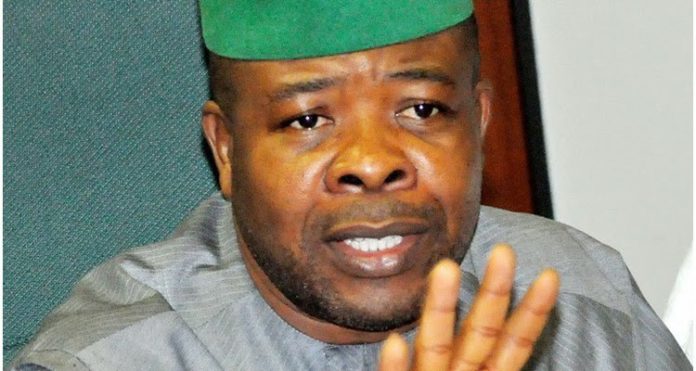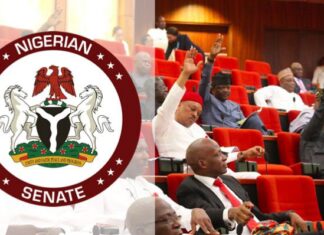By Emeka Alex Duru
The wild celebration that accompanied the declaration of Emeka Ihedioha as the Imo State governor-elect, was not for nothing. It was expected. For the indigenes, the election came with a strong message. There is, for instance, a running tread that Imo had not been lucky with good governance since the exit of the second republic governor, Dr. Sam Mbakwe, in 1983.
This categorization covers the period of the military administrations in the state. But at no time had the State slipped below the bar of governance as in the last 12 years that covered the administrations of Ikedi Ohakim (2007 – 2011) and Rochas Okorocha (from 2011). Within the time, Imo has been mentioned among other states largely in derision.

The years of the locust began to take a turn for the worst with Ohakim when the flag of governance was lowered to a ridiculous level. Against the expectations of addressing the issues of development confronting the state, Ohakim rather made light of his schedule, abandoning the critical side of governance and settling for the mundane. Thus, when Okorocha, who rode on the popularity of the All Progressives Grand Alliance (APGA), trounced him in 2011, the excitement of the traumatised residents and indigenes, knew no bounds.
Okorocha had also come with a comprehensive package that presented a dummy of putting the state on the path of development. With flurry of welfare pronouncements that included free education, free health care for the poor and elderly, affordable housing and infrastructure uplift of the communities, the people readily flocked to him. It did not however take time for perceptive observers to note that Imo had fallen into the wrong hands.
In place of repositioning the state that is blessed with abundant human and material resources, Okorocha took it many steps backwards. But the last in his antics at holding down Imo, was his agenda at being succeeded by his son-in-law, Uche Nwosu. Not even the resistance by his party, the All Progressives Congress (APC) on the dubious agenda, could deter Okorocha. He rather caused Nwosu and his minions in the House of Assembly, including the Speaker, Acho Ihim, to defect to the Action Alliance (AA), to actualise the odious agenda.
This last ditch effort to foist Nwosu on Imo, was what brought the governor and the people on a collision course. And he lost out. Thus, with the emergence of Ihedioha who had angled for the office in 2015, a new chapter has been opened in Imo politics.
The governor-elect polled 273,404 votes to defeat 69 other candidates including Nwosu, who scored 190,364 votes. All Progressives Grand Alliance candidate, Senator Ifeanyi Ararume, polled 114,676 followed by the All Progressives Congress candidate, Senator Hope Uzodimma, who scored 96,458 votes. Accord Party candidate, Ohakim secured 6,864 votes.
Return to Imo Charter of Equity?
The Ihedioha victory and his governance, if well harnessed, may signal a return to the Imo Charter of Equity, signed and endorsed by prominent Imo political leaders in 1991, to ensure balance, equity and justice by rotating power among the three zones. But for the truncation of the charter, incidentally, by Okorocha, the three senatorial zones of the state – Orlu, Owerri and Okigwe, would have had shots at the Imo government house. At worst, the last election would have been a straight fight between Owerri and Okigwe Zones.
Nwosu hails from Orlu (Imo West), just like the governor, that controls 12 out of 27 Councils in the state. It is also the same zone that had produced Achike Udenwa between 1999 and 2007. With the exception of the short-lived administration of Ohakim from Okigwe Zone (Imo North) between 2007 and 2011, Orlu has governed Imo for 16 years out of 20 years since the return of civil rule.
Many had seen the domination by Orlu as a potential source of acrimony in the state. This accounted for the resolute opposition of most fair-minded Imo people to Okorocha’s agenda at imposing his in-law on the state. It was also part of the reasons why the aspiration by Uzodinma, also from Orlu Zone, did not receive much enthusiasm aside the low popularity rating of his APC in the South East geo-political zone.
By the turn of events, the charter of equity may be back on track. In that regards, Okigwe zone should produce the next governor by the time the Owerri Zone must have exhausted the Ihedioha tenure. That is, baring intrusions into the understanding.
Back to the basics
The governor-elect also has the task of restoring the lost glory of the state. At creation in 1976, Imo had set up as an entity with a mission. Bereft of functional infrastructural facilities on account of the 1967 – 1970 civil war that had left the entire geographical East bare, the forebears of the state had set upon themselves the task of making it at par with its advantaged peers, relying essentially on communal and self-help efforts. With the election of Mbakwe as its first civilian governor in 1979, the entire efforts were coalesced into a collective vision, which, four years after, had made the state the envy of other states that did not even witness the civil war. With focused leadership and sheer determination by the people, the state embarked on variety of projects that spanned industrialization, road construction, massive surge in educational institutions, including state university, Imo Airport and other people-oriented measures.
Alongside these development initiatives was the strict emphasis on morals among the people. With time however, the state, gradually fell into a succession of rulers with blurred vision. The worst of this came after the administration of Udenwa when Imo slipped into the hands of leaders with imprecise backgrounds and antecedents. That has remained the bane of development in Imo.
Hopes are however not lost, with the turn of events. Even with critics accusing Ihedioha of arrogance and haughty carriage, none has mentioned him among those with fleeting pedigree. Indigenes and residents of the state, especially those that had seen the state in its glorious past, would therefore expect him to restore it to the days when hard work was seen and celebrated as a virtue.
How the governor-elect would go about the daunting task of recovering Imo, many argue, would have a lot to do on his blueprint for governance and those he would assemble to assist him actualise the dream. Having run for the office twice, since 2015, the expectation is that he should have a working document on the ways and means to reposition the state.
He may be lucky to have a handful of good hands to work with if he chooses to look beyond party affiliation and other petty sentiments. For a state that ranks among those with the highest number of educated men and women in the country, as well as experts in various fields, assembling a team of storm troopers to recover Imo, should not pose any challenge for Ihedioha. How he goes about the exercise, will however, be another thing.











